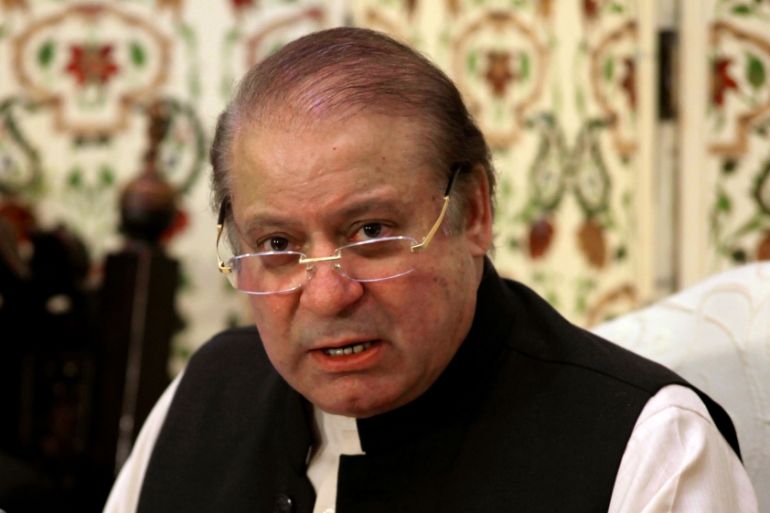Pakistani court bans ex-PM Nawaz Sharif from parliament for life
Ruling effectively ends any political future of Sharif, who was dismissed last year over corruption charges.

Islamabad, Pakistan – Pakistan’s Supreme Court has disqualified former Prime Minister Nawaz Sharif, dismissed from his post over corruption allegations last year, from holding public office for life.
A five-member bench of the country’s apex court unanimously ruled on Friday that anyone disqualified under a constitutional clause requiring legislators to be “honest and trustworthy” would be considered banned for life.
Keep reading
list of 4 itemsSupporters of Pakistan ex-PM Khan’s party protest for fair election results
Pakistan’s real test begins after election, say analysts
‘Election engineering’: Is Pakistan’s February vote already rigged?
Sharif was dismissed from office as prime minister in July of last year, in a case lodged over disclosures in the Panama Papers leak, but which ultimately hinged on allegations that he had failed to declare a salary from his son’s UAE-based company.
Sharif says that he never received the salary, and that he held a position within that company in order to maintain a valid business visa in the Gulf state. The Supreme Court ruled that whether he received the salary or not was immaterial.
The three-time prime minister and three of his children continue to face trial for corruption charges in a National Accountability Bureau court, which is due to deliver a verdict in the coming weeks.
Pakistan is due to hold a general election in July.
‘No accusation has been proven’
Sharif’s PML-N, which continues to hold a strong majority in parliament, termed the decision an attack on democracy.
“This is an accusation on which a sitting prime minister was disqualified, the trial is ongoing and … no accusation has yet been proven,” said State Minister for Information Marriyum Aurangzeb, speaking to reporters shortly after the verdict was announced. “Yet, he has been banned for life.”
“Pakistan is fighting the case for democracy, and Nawaz Sharif will take this to its final conclusion.”
Pakistan has had a tumultuous history with democracy, being ruled by the military for roughly half of the 70 years since it gained independence from the British.
Sharif himself had twice been removed from office during previous stints in power in the 1990s, once, after a tussle with the president and a second time, in a military coup by former army chief Pervez Musharraf.
In July, the court ruled that he was unfit for office, citing article 62(1)(f) of the Constitution, which stipulates certain subjective characteristics in order for a Pakistani to be a member of parliament.
The characteristics include being “sagacious, righteous and non-profligate [and] honest and trustworthy”.
Friday’s verdict applies to any legislator disqualified from office under the same clause of the Constitution.
Jahangir Tareen, a key leader of the opposition Pakistan Tehreek-e-Insaf (PTI) party, was also dismissed from office by the Supreme Court in December under the same clause, for incomplete financial disclosures in his parliamentary declarations.
Asad Hashim is Al Jazeera’s web correspondent in Pakistan. He tweets @AsadHashim.